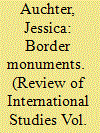| Srl | Item |
| 1 |
ID:
120466


|
|
|
|
|
| Publication |
2013.
|
| Summary/Abstract |
Immigrant deaths have increased in recent years due to changes in border enforcement practices, yet less attention has been paid to the memorialisation of undocumented immigrants who die crossing the US-Mexico border. This article explores the ordering mechanisms of statecraft through an examination of how the dead bodies of undocumented migrants pose a resistance to these mechanisms. I first lay out my conception of statecraft and the bordering practices involved in this specific context, then address the memorialisation of undocumented immigrants who lost their lives crossing the border. The article embarks on a journey through anonymous desert gravesites and small desert cemeteries haunted by the spectres of immigration. It explores the contestation surrounding memorialisation of death through the monument, the narratives of anonymity surrounding the memorialisation of undocumented immigrants, and the counter-memory discourses that emerge in an effort to rewrite the meaning of these migrant deaths. These counter-memorial discourses, I argue, posit desert border monuments as a threat to statecraft because they cannot be situated within the (b)ordering mechanisms of the state.
|
|
|
|
|
|
|
|
|
|
|
|
|
|
|
|
| 2 |
ID:
157971


|
|
|
|
|
| Summary/Abstract |
Forced male circumcision has not yet been recognized as a specific gendered human rights abuse in international humanitarian law. This article takes the first step towards assessing these acts by considering them in the context of post-election violence in Kenya in 2007. This case allows for the exploration of how forced male circumcision was used in a context of political violence and militia-led—and often state-sanctioned—terror. The article thus considers multiple legal issues and concerns that arise from this sort of violence in different contexts. I situate the case within a larger framework of conventional understandings on gender and violence as a means to question them and render them problematic. Specifically, I argue that understanding sexual violence as exclusively targeting women prevents appropriate prosecution of forced male circumcisions in Kenya and of sexual violence against men more generally. Sexual violence against men involves forms of emasculation in which perpetrators seek to feminize their victims by rendering them weak, violated and passive, in contradistinction to stereotypical masculine ideals. If one's relationship to femininity is a crucial issue in sexual violence, whether the victims are men or women, then being able to properly account for cases like Kenya, in both a political and a legal sense, is crucial to legal accountability for sexual violence more broadly.
|
|
|
|
|
|
|
|
|
|
|
|
|
|
|
|
| 3 |
ID:
145149


|
|
|
|
|
| Summary/Abstract |
What does taking dead bodies seriously tell us about the state of global security studies? Dead bodies play different roles in conventional, human, and critical security studies and thus thinking about them opens conversations among these different approaches. This paper pushes further to argue that scholars should think about the global dead as an analytical category. It demonstrates that doing so will allow us to rethink the measurement of war casualties, and examine the assumptions embedded in quantitative casualty data, the ethnography of these numbers, and the politics of representing them. Establishing the dead as an analytical category also widens the lens of dead body management to examine how dead bodies are not only objects but also subjects of security. This should lead us to ask about the politics behind how they are secured and governed, as well as the political and legal structures in place to manage them. Corpses matter for how we define security and they matter a great deal for a wide variety of security behavior. Up until now, security scholars have treated them implicitly but we can understand much more about the politics of the dead if we make them an explicit category of study.
|
|
|
|
|
|
|
|
|
|
|
|
|
|
|
|